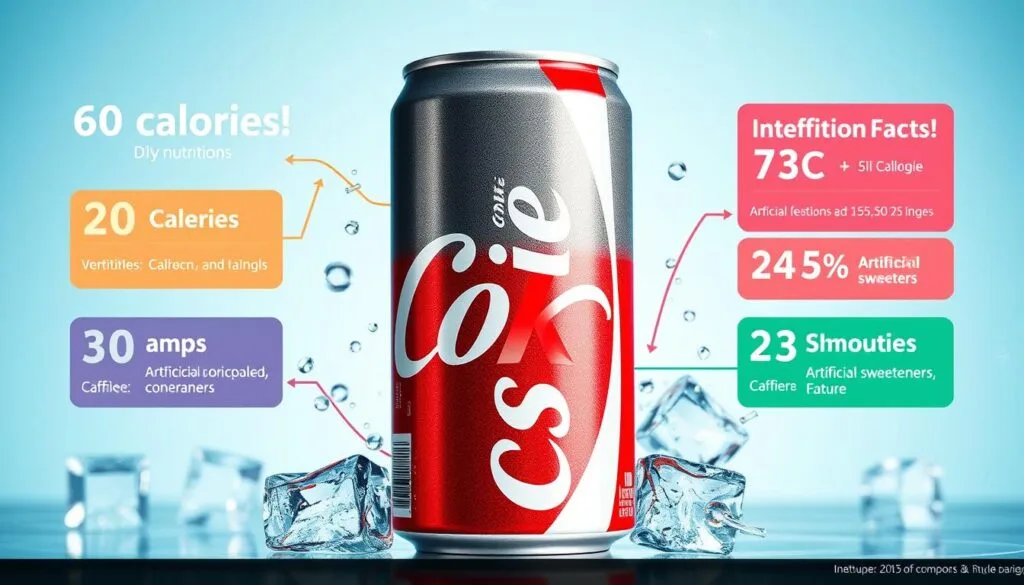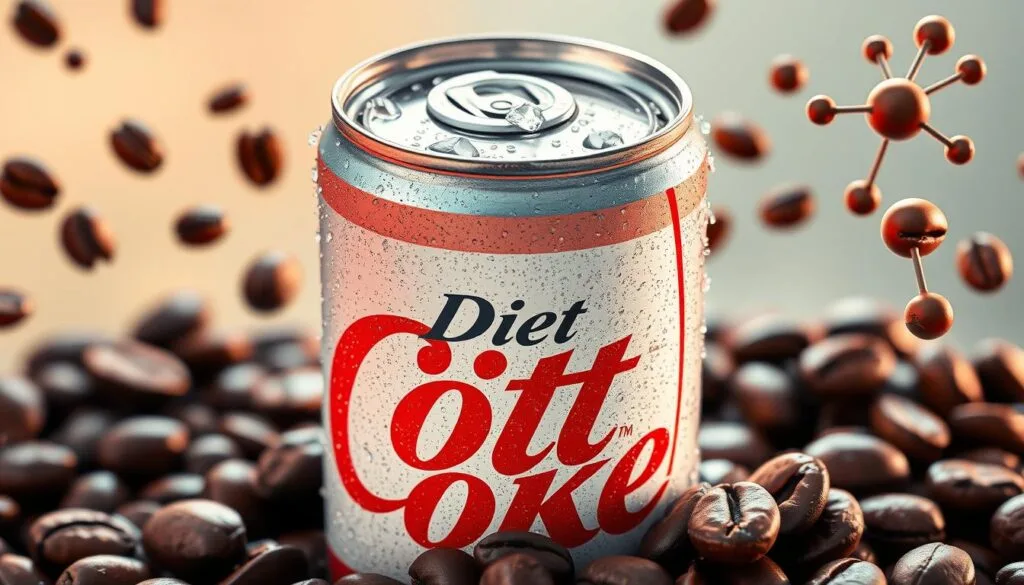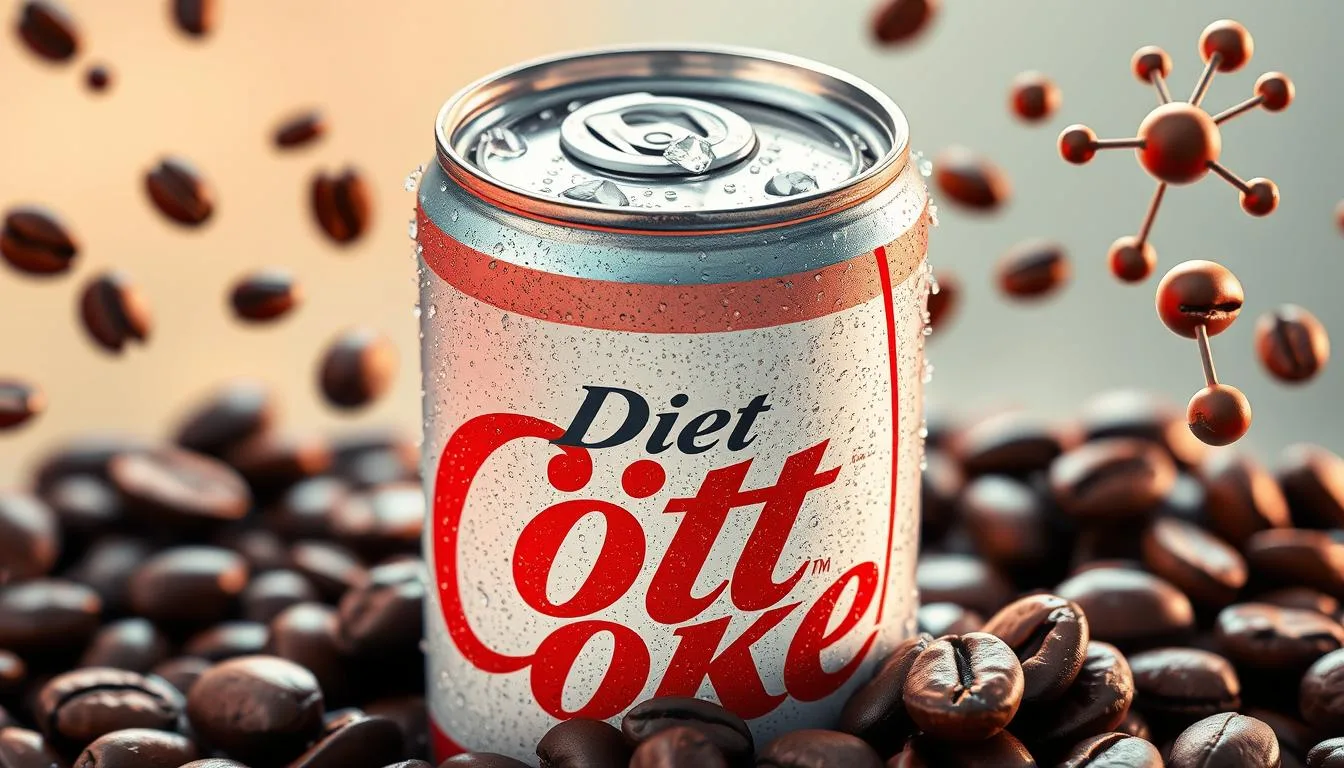Diet Coke Nutrition Facts: Everything You Need to Know
Diet Coke is a sugar-free, low-calorie version of Coca-Cola, introduced in 1982. It has become a favorite among health-conscious people. Knowing the nutrition facts about Diet Coke is important. This article will give you all the details about its ingredients, nutritional values, and health effects.

Table of Contents
Understanding Diet Coke Nutrition Composition
Diet Coke is a unique soft drink made by the Coca-Cola Company. It’s different from regular Coke because it uses artificial sweeteners instead of sugar. This makes it a low-calorie choice for those watching their diet.
Basic Ingredients Overview
The main ingredients in Diet Coke are:
- Carbonated water – This is what makes Diet Coke fizzy.
- Caramel coloring – It gives the drink its brown color.
- Phosphoric acid – This adds a tangy taste.
- Aspartame – The main sweetener that replaces sugar.
- Caffeine – It gives a stimulating kick, like in other Coca-Cola drinks.
Manufacturing Process
To make Diet Coke, the ingredients are mixed and blended together. The Coca-Cola Company follows strict quality control. This ensures every can or bottle is consistent and safe.
Quality Control Standards
The Coca-Cola Company focuses on quality from start to finish. They use top-notch materials and test thoroughly. This dedication to quality keeps Diet Coke reliable and meets the needs of health-aware consumers.
Diet Coke Nutrition Facts Label Explained
The diet coke nutrition facts label on your can is key. It shows zero calories and zero sugar. This makes Diet Coke a top pick for those watching their calorie intake or blood sugar.
The label details Diet Coke’s nutritional parts, including:
- Total Fat: 0g
- Sodium: 40mg
- Total Carbohydrates: 0g
- Sugars: 0g
- Protein: 0g
- Caffeine: 46mg per 12 fluid ounces
Diet Coke and Coke Zero Sugar differ slightly. Diet Coke lists aspartame as its third ingredient. Coke Zero Sugar has it as the fourth. Coke Zero also uses acesulfame potassium as a sweetener.
The label gives a clear view of Diet Coke’s nutrients. It helps you decide how much to drink. It’s great for those watching calories in diet coke or managing their diet.
“Both Diet Coke and Coke Zero are made with artificial sweeteners that are 200 to 700 times sweeter than table sugar.”
Some people might feel bad after drinking Diet Coke. They might get bloating, gas, headaches, or feel sensitive to cancer risks. Always talk to a doctor before making diet changes.
Caloric Content and Energy Values
Diet Coke is known as a zero-calorie soda. But what does this really mean? Let’s look into its nutritional breakdown to see why it’s considered calorie-free.
Zero Calorie Breakdown
A 12-ounce can of Diet Coke has 0 calories. This is thanks to artificial sweeteners that give it sweetness without calories. Aspartame, the main sweetener, is much sweeter than sugar, making it calorie-free.
Energy Content Analysis
Diet Coke may be calorie-free, but it does have some energy. It has 46 mg of caffeine, which can give you a boost. But its energy content is much less than regular soda, which has up to 179 calories per 12-ounce serving.
| Beverage | Calories per 12 oz Serving |
|---|---|
| Regular Coca-Cola | 140 |
| Diet Coke | 0 |
| Coke Zero | 0 |
In short, Diet Coke is indeed a zero-calorie drink. It has no calories except for a bit of caffeine. This makes it a good choice for those watching their caloric intake and wanting a low-calorie soda option.
Artificial Sweeteners in Diet Coke
Diet Coke uses artificial sweeteners to give it a sweet taste without calories. Sweeteners like aspartame and acesulfame potassium are much sweeter than sugar. This lets them replace sugar in diet sodas like Diet Coke.
Artificial sweeteners in Diet Coke cut down on calories and sugar. But, research on their long-term health effects is ongoing. Some studies suggest they might cause metabolic issues, gut problems, and heart disease risks.
For instance, one study found aspartame lowers a good gut acid called isobutyric acid. Other research links artificial sweeteners to insulin resistance. This could raise the risk of type 2 diabetes.
But, the research on artificial sweeteners in Diet Coke is mixed. Some studies find no harm from diet soda. Others link it to weight gain, dental problems, and brain issues.
To know the full story, more research is needed on sugar-free soda like Diet Coke. People should think about the pros and cons before choosing artificial sweeteners in diet coke for their lifestyle.
| Potential Concerns with Artificial Sweeteners in Diet Coke | Potential Benefits of Artificial Sweeteners in Diet Coke |
|---|---|
| Increased risk of metabolic issues and insulin resistance Potential impact on gut health and the microbiome Possible association with cardiovascular complications Potential link to weight gain and cravings for high-calorie foods Possible negative effects on dental health Potential neurological problems, such as headaches and migraines | Reduction in calorie and sugar intake Potential for weight management and calorie control No added sugars or carbohydrates Suitable for individuals with diabetes or those watching their sugar intake |
Diet Coke Nutrition and Daily Values
Diet Coke is a zero-calorie soda with some benefits. It’s not a health food, but knowing its diet coke nutrition facts helps you make better choices.
Mineral Content
Diet Coke and Coke Zero Sugar have 40 milligrams of sodium per 12-ounce can. This is 2% of the daily sodium intake. Coke Zero Sugar also has 60 milligrams of potassium, thanks to potassium citrate. This is 2% of the daily potassium intake.
Vitamin Presence
Diet Coke and Coke Zero Sugar don’t have much in terms of vitamins or minerals. They are mostly empty calories, lacking in nutritional value.
Daily Intake Recommendations
The main diet coke health benefits are its zero calories and sugar. It’s good for those watching their calorie intake. But, it’s not a healthy drink. Drinking it in moderation is important for your diet and lifestyle.
“Moderation is key when incorporating Diet Coke into your overall diet and lifestyle.”
Caffeine Content and Effects
Diet Coke is known for its caffeine content. It has 46 milligrams of caffeine in every 12-ounce serving. This is 12 milligrams more than Coke Zero’s 34 milligrams. The caffeine in Diet Coke can give you energy and make you feel more alert.
But, it’s crucial to know how caffeine affects your body. Caffeine is a stimulant that can be good or bad for your health. In small amounts, it can help you focus and perform better. Yet, too much caffeine can cause jitteriness, anxiety, insomnia, and digestive problems.
- Statista found that 74% of Americans drink coffee every day in 2022. Each cup has about 144 milligrams of caffeine.
- Other popular sodas like Canada Dry Ginger Ale, Sprite, and Mug Root Beer have no caffeine in a 12-ounce serving.
- Some drinks, like Sunkist and Barq’s Root Beer, have a bit of caffeine. They have 19 to 22 milligrams per 12-ounce serving.
It’s key to watch your caffeine intake from all sources, including Diet Coke. This helps avoid negative side effects. If you’re caffeine-sensitive or want to cut down, look for low-or-no-caffeine drinks.

Comparing Diet Coke to Regular Coca-Cola
The debate between Diet Coke and regular Coca-Cola is intense. Both have the iconic Coca-Cola taste, but they differ in nutrition and taste. Let’s dive into these differences.
Nutritional Differences
Regular Coca-Cola has 140 calories and 39 grams of sugar in one can. Diet Coke, on the other hand, is calorie-free. It uses artificial sweeteners like aspartame, which are much sweeter than sugar.
Diet Coke also has more caffeine than Coke Zero. It has 46 mg per 12 oz, while Coke Zero has 34 mg. But, both have less caffeine than an 8-ounce coffee, which has 96 mg.
Taste Profile Comparison
People have different opinions on the taste. Some like the bold flavor of regular Coca-Cola. Others prefer Diet Coke’s crisp, less sweet taste.
The choice between diet coke vs regular coke depends on personal taste and dietary needs. Whether you want a zero-calorie option or the classic Coca-Cola taste, there’s something for everyone.
| Nutritional Fact | Regular Coca-Cola | Diet Coke |
|---|---|---|
| Calories | 140 | 0 |
| Sugar (g) | 39 | 0 |
| Caffeine (mg) | 34 | 46 |
| Sodium (mg) | 40 | 40 |
“The classic rivalry between Diet Coke and regular Coca-Cola is a topic of much debate.”
Health Considerations and Research
The health effects of Diet Coke are complex. Diet sodas like Diet Coke can help with calorie intake and blood sugar. But, there are concerns about long-term effects. Let’s explore the diet coke health benefits and diet coke side effects in more detail.
Diet Coke is calorie-free, which helps with weight management. But, artificial sweeteners like aspartame might increase cravings and harm the gut. Also, drinking too much of these sweeteners can raise the risk of type 2 diabetes and heart disease.
The safety of aspartame, Diet Coke’s main sweetener, is debated. The International Agency for Research on Cancer says it might be cancer-causing. But, the FDA and others say it’s safe in small amounts.
“For the average person not exceeding the acceptable daily intake, aspartame is not known to pose any serious risks or have major side effects.”
People with PKU, a rare disorder, should avoid aspartame. They can’t break down the amino acid phenylalanine in it.
When thinking about Diet Coke’s health impact, consider both sides. The calorie savings might be worth it, but artificial sweeteners and high phosphorus are concerns. Always choose what’s best for your health, in moderation.

Diet Coke in Weight Management
Diet Coke is a popular choice for those watching their weight. It’s a low-calorie soda that might help with calorie reduction. But, it’s best to enjoy it in moderation as part of a healthy diet and lifestyle.
Role in Calorie Reduction
Diet Coke has no calories, making it appealing for weight management. It can help you cut down on calories without losing the taste of your drinks. Yet, it’s important to focus on a balanced diet and lifestyle for lasting results.
Impact on Appetite
The artificial sweeteners in Diet Coke have sparked interest in weight management. Some studies suggest they might affect appetite and metabolism. But, the research is still mixed. It’s best to listen to your body and eat a variety of healthy foods, not just low-calorie drinks.
FAQ
What are the nutrition facts for Diet Coke?
Diet Coke has no calories and no sugar. This makes it a good choice for those watching their diet.
What ingredients are in Diet Coke?
Diet Coke uses artificial sweeteners instead of sugar. These sweeteners are mixed with other ingredients to make the soda.
How many calories are in Diet Coke?
Diet Coke has zero calories. It uses artificial sweeteners to add sweetness without calories.
What kind of sweeteners are used in Diet Coke?
Diet Coke uses artificial sweeteners. These sweeteners add sweetness without calories. But, research on their long-term health effects is ongoing.
Does Diet Coke have any nutritional benefits?
Diet Coke has very little in terms of minerals and vitamins. It doesn’t offer much nutritional value compared to other drinks or foods.
How much caffeine is in Diet Coke?
Diet Coke contains caffeine. Caffeine can have both good and bad effects on the body. The amount in Diet Coke can vary, so it’s good to know its impact on health.
How does Diet Coke compare to regular Coca-Cola?
Diet Coke and regular Coca-Cola differ in calories, sugar, and taste. Diet Coke is a zero-calorie, sugar-free version of the classic soda.
Is Diet Coke healthy?
Research on diet soda, like Diet Coke, is still ongoing. It might help with calorie control and blood sugar. But, there are concerns about long-term effects.
Can Diet Coke help with weight management?
Diet Coke is a low-calorie choice for those trying to manage their weight. But, sugar substitutes might not lead to lasting weight loss or maintenance.
DID OUR INFORMATION HELP YOU ?
There are no reviews yet. Be the first one to write one.

